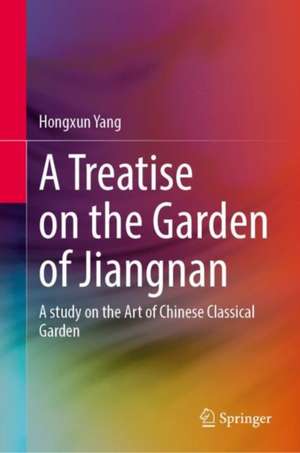A Treatise on the Garden of Jiangnan: A study on the Art of Chinese Classical Garden
Autor Hongxun Yang Traducere de Aibin Yan, Biyu Wu, Hui Sunen Limba Engleză Hardback – 3 aug 2022
This book presents a study into the art of Jiangnan classical garden. Jiangnan (“the south of the Yangtze River”) refers to the water network region along the lower reaches of the Changjiang River (formerly known as Yangtze River), where Jiangsu Province Chinese gardens were primarily constructed during the 16th and 17th centuries of the later Ming and early Qing dynasties. The Jiangnan garden, an architectural space where artificial and natural elements are combined, represents the elite of classical Chinese gardens and serves as a prime exemplar for its northern counterpart, the Ming and Qing imperial gardens.
The book pursues an interdisciplinary approach, combining historical information with case studies and other methods. Charts and pictures are used to supplement and reinforce the conclusions drawn from the macro narrative, enhancing the authenticity and readability of the historical monographs. It represents the first study of the classical art of landscape design in China, offering readers an insightful introduction.
| Toate formatele și edițiile | Preț | Express |
|---|---|---|
| Paperback (1) | 912.91 lei 6-8 săpt. | |
| Springer Nature Singapore – 4 aug 2023 | 912.91 lei 6-8 săpt. | |
| Hardback (1) | 918.20 lei 6-8 săpt. | |
| Springer Nature Singapore – 3 aug 2022 | 918.20 lei 6-8 săpt. |
Preț: 918.20 lei
Preț vechi: 1119.76 lei
-18% Nou
Puncte Express: 1377
Preț estimativ în valută:
175.72€ • 182.78$ • 145.07£
175.72€ • 182.78$ • 145.07£
Carte tipărită la comandă
Livrare economică 14-28 aprilie
Preluare comenzi: 021 569.72.76
Specificații
ISBN-13: 9789811669231
ISBN-10: 9811669236
Pagini: 695
Ilustrații: XIV, 695 p. 1 illus.
Dimensiuni: 155 x 235 mm
Greutate: 1.23 kg
Ediția:1st ed. 2022
Editura: Springer Nature Singapore
Colecția Springer
Locul publicării:Singapore, Singapore
ISBN-10: 9811669236
Pagini: 695
Ilustrații: XIV, 695 p. 1 illus.
Dimensiuni: 155 x 235 mm
Greutate: 1.23 kg
Ediția:1st ed. 2022
Editura: Springer Nature Singapore
Colecția Springer
Locul publicării:Singapore, Singapore
Cuprins
Preface The Classical Garden of China - An Art of Time and Space that Portrays Nature
Chapter One Introduction
1.1 Demand for a Garden
1.2 Basic Concept of Chinese Classical Gardens: Integration of Human Environment
1.3 International Influence of the Classical Garden of China
1.4 The Garden of Jiangnan of the Classical Garden of China
Chapter Two On the Art of Landscape Design2.1 Introduction - Form of Time Space Art of Practical Value
2.2 Functional Aspect of the Garden of Jiangnan-- the Manner of Garden Living the Concept of Landscape Design a Working Philosophy
2.3 Scenic Imagery - the Basic Ingredient of the Art of Landscape Design, the Form of Garden Living
Chapter Three On the Design of Garden
3.1 Formation of Scenic Imagery
3.2 On the Creation of Scenic Imagery-- the Scenic Imagery Outside the Bound of Perception
Chapter Four Critique and Discussion on Some Typical Gardens
4.1 Examples of Garden in the City
4.2 Examples of Garden in Mountain and Wooded Area
4.3 Examples of Garden Besides River and Lake
4.4 Examples of Garden in Villages Xiao Lian Zhuang
Chapter Five Conclusion
Appendixes 1 Catalogue of the Illustrations of A Treatise on the Garden of Jiangnan
Appendixes 2 A Treatise on the Garden of Jiangnan a Synopsis
Notă biografică
Hongxun Yang is a professor specialized in the classical art of Chinese landscape design. He has served as director of the Institute of Archaeology, Chinese Academy of Social Sciences, director of the Institute of Architectural History, the Architectural Society of China, a member of the Russian National Academy of Architectural Heritage Sciences, and an advisor to UNESCO.
Textul de pe ultima copertă
This book presents a study into the art of Jiangnan classical garden. Jiangnan (“the south of the Yangtze River”) refers to the water network region along the lower reaches of the Changjiang River (formerly known as Yangtze River), where Jiangsu Province Chinese gardens were primarily constructed during the 16th and 17th centuries of the later Ming and early Qing dynasties. The Jiangnan garden, an architectural space where artificial and natural elements are combined, represents the elite of classical Chinese gardens and serves as a prime exemplar for its northern counterpart, the Ming and Qing imperial gardens.
The book pursues an interdisciplinary approach, combining historical information with case studies and other methods. Charts and pictures are used to supplement and reinforce the conclusions drawn from the macro narrative, enhancing the authenticity and readability of the historical monographs. It represents the first study of the classical art of landscape design in China, offering readers an insightful introduction.
Caracteristici
Presents a study on the Jiangnan garden
Pursues an interdisciplinary approach to the study of Chinese gardens
The Chinese edition was selected as the best archaeological book of the twentieth century in 2001
Pursues an interdisciplinary approach to the study of Chinese gardens
The Chinese edition was selected as the best archaeological book of the twentieth century in 2001
